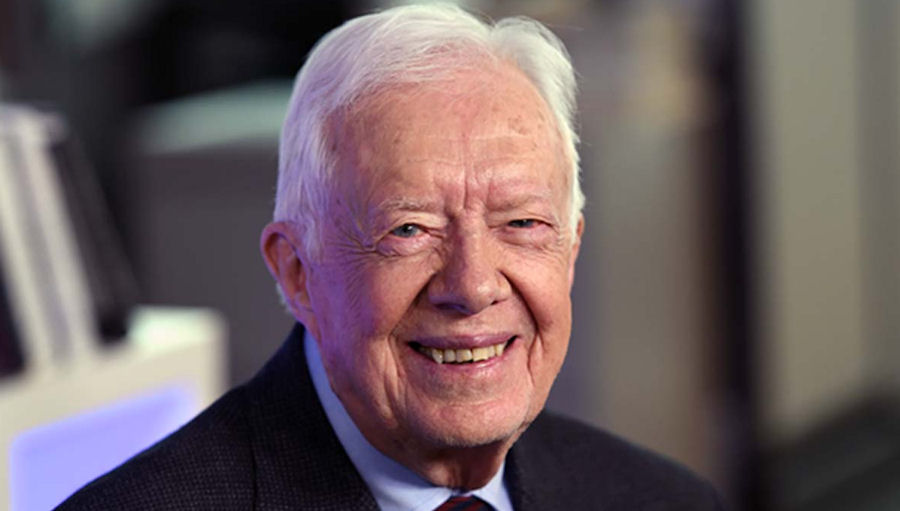
“I say to you quite frankly that the time for racial discrimination is over” – Jimmy Carter
Podcast: Play in new window | Download
Subscribe: Spotify | Amazon Music | Youtube Music | RSS
Jimmy Carter Biography
Naval officer, senator, governor, president… and the only peanut farmer to ever win the Nobel Prize. Jimmy Carter served only one term as President of the United States, but his competent and compassionate approach to government left behind a long legacy that continues to affect American life every day.
The boy who would be the thirty-ninth president of the United States was born on 1st October 1924, in the rural farming town of Plains, Georgia to James Earl Carter Sr. and Lillian Gordy, a peanut farmer, and registered nurse respectively. Peanut farming, politics, and devotion to the Baptist church dominated almost every aspect of their idyllic life.
Carter started his education in the Plains public schools, then later attended Georgia Southwestern College and the Georgia Institute of Technology. He went on to receive a Bachelor of Science degree from the U.S. Naval Academy in 1946. Upon graduation, Carter married Rosalynn Smith, a hometown girl from Plains. The couple would go on to have three sons and a daughter.
During his time in the Navy, Carter was a submariner, rising to the rank of lieutenant as he served in both the Atlantic and Pacific fleets. Handpicked by Admiral Hyman Rickover for the nuclear submarine program, Carter was assigned to Schenectady, New York, to further his education with graduate work at Union College in reactor technology and nuclear psychics.
After seven years’ service in the Navy, Carter requested commission when his father died in 1953. He and Rosalynn returned home to Georgia and Carter took over the family business and the family peanut farm.
Back home, Carter quickly became a pillar of the community and took up leadership roles on county boards supervising education, hospitals, and the library.
Carter saw serving his community as his proud duty and, in 1962, was elected to the Georgia Senate. He would go on to lose his first governor campaign in 1966, but won the next election and became Georgia’s 76th governor on January 12, 1971.
A part of a new breed of Southern governors, Carter drew attention and ire by emphasizing ecology, governmental efficiency, and the destruction of racial barriers.
At the end of 1974, Carter announced his candidacy for president. Carter’s great aspiration was to make the government competent and compassionate in response to the needs and expectations of the American people. Over the course of two years, his campaign slowly gained momentum. The time and work paid off, and he won the first ballot at the 1976 Democratic National Convention.
Carter selected Senator Walter F. Mondale of Minnesota as his running mate and the campaign kept gaining ground. After a hard run that included three debates, Carter was victorious over President Gerald Ford, pulling out a win with 297 electoral votes to Ford’s 241.
The Carter Administration lasted from January 20, 1977 to January 20, 1981. His foreign and domestic achievements were notable and something to be proud of, but it was an era defined by rising energy costs, mounting inflation, and tension at home and abroad.
The farmer in Carter came out as he rolled up his sleeves and went to work combating inflation and unemployment. He sought to deal with the energy shortage by establishing a national energy policy and deregulating domestic petroleum prices to stimulate production. He prompted federal efficiency through civil service reform and proceeded to deregulate the trucking and airline industries.
Carter also strove to improve the environment. His expansion of the national park system included the Alaska National Interest Conservation Act that led to the protection of 103 million acres of Alaskan land.
In an effort to increase human and social services, Carter created the Department of Education. He also appointed record numbers of women, blacks, and Hispanics to government jobs at every level possible.
Carter’s foreign policy track record was also unique. Though he helped to bring peace between Egypt and Israel through the Camp David agreement of 1978, the Soviet Union and some other nations were less open to his interests in human rights. However, he did succeed in ratifying the Panama Canal treaties and he established full diplomatic relations with the People’s Republic of China. The Soviet Union was also swayed into signing the SALT II treaty on nuclear limitation.
News of U.S. embassy staff taken hostage in Iran dominated the news during the last 14 months of Carter’s term. Coupled with continuing inflation, the holding of the American captives was a major reason for Carter’s loss in the 1980 election. Undeterred by his loss of title, Carter continued to be involved in negotiations to free the hostages. The 52 American hostages were finally released by Iran same day Carter left office.
After leaving office, Carter became University Distinguished Professor at Emory University in Atlanta, Georgia, and founded The Carter Center.
With direct leadership and involvement from Carter, the nonpartisan and nonprofit Carter Center was designed to address national and international issues of public policy.
Committed to the resolution of conflict, promotion of democracy, protection of human rights, and the prevention of disease and other afflictions, the Carter Center fellows, associates, and staff seek to help fashion a better world without the influence of politics or agenda.
For his tireless efforts in the pursuit of peace and democracy, Carter was awarded the Presidential Medal of Freedom in 1999 and, in 2002, became the only peanut farmer to ever receive a Nobel Peace Prize.
He and Rosalynn continue to be active in their community and with Habitat for Humanity, helping to build homes for people in need
Podcast: Play in new window | Download
Subscribe: Spotify | Amazon Music | Youtube Music | RSS




